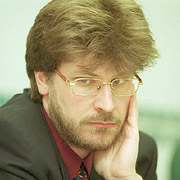© «Russia in
Global Affairs». № 1, January — March 2009
 The global crisis
The global crisis
is being discussed so much that there seems to be no aspect left
that has not been analyzed in depth.
The answer to the question “Who is to blame?” is well known.
Everyone blames the greed of Wall Street and the irresponsibility
of the state which refrained from controlling the markets. Another
classic question – “What to do?” – does not have a generally
accepted answer yet, and, to all appearances, will never have.
Despite unanimous statements that countries should coordinate their
efforts in order to overcome the recession, their practical actions
reveal their willingness to try to survive single-handedly.
It still remains unclear what comes next, how the economic
cataclysms will affect the alignment of forces in the world, who
(if anyone at all) stands to gain from the crisis, and whether one
should expect fundamental changes in the international system.
The Director of the Foreign Policy Planning Department at the
Russian Foreign Ministry, Alexander Kramarenko, holds that the
crisis is a natural result of post-Cold War attempts to impose one
type of political and economic development on the world. He
believes that the crisis is opening an opportunity to build a truly
effective world order.
Olga Butorina says that globalization is acquiring an
increasingly manifest regional dimension. Differences in economic
development between various groups of countries make them react in
different ways to the crisis, thus promoting regional coordination.
The author views the crisis as a chance for a “decisive
breakthrough in financial integration within the CIS framework.”
Recent months have shown that in the conditions of universal
decline post-Soviet countries have no one to rely on except
Moscow.
Vladimir Mau believes that the crisis has made the inseparable
interdependence of the Chinese and U.S. economies still more
evident. The development of this tendency will result in a
geopolitical reconfiguration on the world arena. In particular, it
issues a challenge to the other actors in international politics.
This applies, first of all, to the European Union, which may lose
its status of a privileged partner of the United States, and to
Russia, which may find itself on the sidelines of major global
processes.
Stefan Schepers offers his own scenario for a strategic
rapprochement between Russia and the EU, which would mark a
markedly new stage in Europe’s unification and turning into a
powerful center of power. In his view, such integration would be in
line with the general logic of European development over the last
few centuries and, especially, over the last 60 years. A new
pan-European project would be as ambitious as the idea put forward
in Western Europe after World War II. Georgy Velyaminov shares this
point of view. He believes that a pan-European alliance is an
imperative, but it cannot be set up unless the issues of security
and confidence are resolved. Both authors suppose that attempts to
achieve close rapprochement between Russia and the EU would meet
with displeasure or, more likely, opposition from the U.S., which
views such developments as disadvantageous to itself.
Adrian Pabst suggests that the presidents of Russia and the U.S.
should revise the security arrangements in the Euro-Atlantic and
Eurasian space. He believes that the views of presidents Barack
Obama and Dmitry Medvedev with regard to future threats are more
adequate to reality than the views of their respective
predecessors. General Victor Yesin proposes practical ways to
overcome the deadlock in Russian-U.S. discussions about the
deployment of elements of the U.S. missile defense system in
Central Europe. This issue poisoned the atmosphere between the two
countries under President George W. Bush.
The crisis serves as yet another reminder of how much the
Russian economy depends on the situation on the hydrocarbon market.
Vladimir Feygin analyzes why oil became a subject of unbridled
speculation during the economic boom of the 2000s and how price
leaps and falls could be avoided in the future. Andrei Bely
discusses the new conditions in which large Russian oil and gas
companies have found themselves after the lending bubble collapsed,
making the investment issue into an acute problem.
Businessman Vladimir Yevtushenkov sees in the crisis a chance to
overcome the “Dutch disease” and introduce a new, innovation
philosophy based on a new type of state-business interaction.
Leokadia Drobizheva raises an issue that has now become
particularly acute, namely national self-determination and
nationalism. Last year was marked by the recognition of
independence of new states (Kosovo, Abkhazia and South Ossetia),
which caused mixed reactions in the world and was described by many
as unlawful. The author discusses how the huge potential of
national sentiments could be used for the good cause of
development. Mikhail Delyagin proposes a plan for Moscow’s
actions vis-à-vis Abkhazia and South Ossetia – territories
that are in a very difficult economic position.
Our next issue will continue analyzing the aftermath of the
crisis, specifically its impact on global security.









